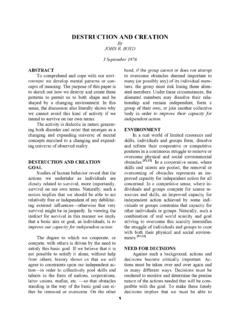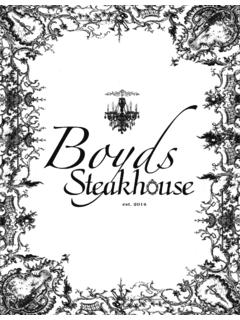Transcription of A SHORT HISTORY OF THE SHORT STORY
1 5| THE QUARTER Summer 2006 LETus begin at a notional beginning. I have an image in my head ofa band of Neanderthals (or some similar troupe of humanoids)hunkered round the fire at the cave-mouth as the night is drawingin. One of them says, spontaneously: You ll never believe what happenedto me today. Gnawed bones are tossed aside, children are quietened andthe tribe gives the storyteller its full attention. The anecdote, the fond rem-iniscence, the protracted joke, the pointed recollection are surely the gene-sis of the SHORT stories we write and read today. You could argue that STORY -telling in one form or other is hardwired into our human discourse as if as soon as our sense of time past and time future evolved in our awaken-ing consciousnesses we became aware we could shape the telling of ourpersonal histories and imagine possibilities that would enchant, terrify,enthral, admonish, titillate and the rest of the gamut of emotions thatattend a compelling this is somewhat fanciful and unproveable, I know, but it strikes methat something of this order must explain the strange power of SHORT fic-tion.
2 The SHORT form is, conceivably, more natural to us than longerforms: the anecdote that lasts several hours is going to find its listenersdrifting away pretty soon. The stories we tell to each other are SHORT , orshortish, and they are shaped. Consider what happens in the telling of atale: even the most unprofessional anecdotalist will find him or herselfhaving to select some details and omit others, emphasise certain eventsand ignore the irrelevant or time-consuming, elide, speed up, slow down,describe key characters but not all, in order to head ideally towards adenouement of some sort. A whole editing process is engaged, almostunconsciously, of choosing, clarifying, enhancing and inventing. A con-vincing lie is, in its own way, a tiny, perfect narrative.
3 The well-told storyseems to answer something very deep in our nature as if, for the durationof its telling, something special has been created, some essence of ourexperience extrapolated, some temporary sense has been made of ourcommon, turbulent journey towards the grave and all this is true then why has it taken so long for the SHORT STORY , as aliterary form, to evolve? After all, the cultural HISTORY of the publishedshort STORY is only a few decades longer than that of film. The answer, ofcourse, is to be found in industrial and demographic processes. The shortstory had always existed as an informal oral tradition, but until the massmiddle-class literacy of the 19th century arrived in the west, and the mag-azine and periodical market was invented to service the new reading pub-lic s desires and preferences, there had been no real publishing forum for apiece of SHORT fiction in the five to 50-page range.
4 It was this new mediumthat revealed to writers their capacity to write SHORT fiction. ReadersWilliam Boyd is a judge of theNational SHORT STORY Prize. He isthe author of eight novels andthree collections of SHORT stories:On the Yankee Station (1981),The Destiny of Nathalie X (1995)and Fascination (2004) Jerry BauerA SHORT HISTORY OFTHE SHORT STORYThe SHORT STORY emerged in a blitzkrieg of 19th-century magazine publishing, reached its apotheosis with Chekhov,and became one of the great 20th-century art forms. With the arrival of the inaugural National SHORT STORY Prize,WILLIAM BOYD reveals his taxonomy of the SHORT STORY , and assesses the state of the British form6| THE QUARTER Summer 2006wanted SHORT stories, and writers suddenly discoveredthey had a new literary form on their hands.
5 Theway the SHORT STORY effectively sprang into being in itsfull maturity almost proves my point. There were nofaltering first steps, no slow centuries of fact that in the early to mid-19th centuryHawthorne and Poe and Turgenev were capable ofwriting classic and timeless SHORT stories virtuallyfrom the outset signals that the ability had alwaysbeen dormant within the human imagination. Theshort STORY arrived fully fledged in the middle of the19th century and by its end, in the shape of AntonChekhov, had reached its who wrote and published the first true mod-ern SHORT STORY ? Who was the great precursor? SHORT narratives and tales had existed for centuriesin one form or another: think of Scheherazade,Boccaccio s Decameronand the Canterbury Tales,letalone the Bible, subplots in plays and novels, satires,pamphlets, sagas, narrative poems, essays, journal-ism.
6 But what is the first literary text we can pointto, classify and declaim with confidence: This is amodern SHORT STORY ? It has been argued that thehonour goes to Walter Scott s STORY The TwoDrovers, published in Chronicles of the Canongate in1827. It s a convenient starting point, if onlybecause the SHORT STORY s subsequent rapid develop-ment was international and Scott s influence, hugein its day, was international also not only inspiringGeorge Eliot and Thomas Hardy at home, but alsoBalzac in France, Pushkin and Turgenev in Russiaand Fenimore Cooper and Hawthorne in one thinks of the influence these writers had inturn on Flaubert and Maupassant, Chekhov, Poeand Melville we can credibly begin to trace thebirth lines of the modern SHORT STORY back to itsoriginal source.
7 The only problem is that afterScott s start, the SHORT STORY in Britain hardly existedin the mid-19th century, such was the dominance ofthe novel; writers in France, Russia and Americaseemed to take more immediately to the form andit s not until Robert Louis Stevenson in the 1880sthat we can see the modern SHORT STORY beginning toemerge and flourish in Britain once more, with theline extending on from Stevenson through Wells,Bennett, James and , in many ways the true beginnings ofthe modern SHORT STORY are to be found in might posit the publication of NathanielHawthorne s Twice-Told Talesin 1837 as a startingpoint. When Edgar Allan Poe read Hawthorne, hemade the first real analysis of the difference betweenthe SHORT STORY and the novel, defining a SHORT storyquite simply as a narrative that can be read at onesitting.
8 This is not as facile as it may seem at Poe was trying to put his finger on was theshort STORY s curious singularity of effect, somethingthat he felt very strongly came from its all-in-one-goconsumption. Poe continues: In the whole composi-tion there should be no word written, of which thetendency, direct or indirect, is not to the one pre-established design. And by such means, with suchcare and skill, a picture is at length painted whichleaves in the mind of him who contemplates it witha kindred art, a sense of the fullest satisfaction. Poe is perhaps too schematic and prescriptive wanting only one pre-established design as thedominating template of a SHORT STORY but he is veryacute on the nature of the effect a SHORT STORY canachieve: a sense of the fullest satisfaction.
9 Theshort STORY can seem larger, more resonant andmemorable than the shortness of the form wouldappear capable of delivering. One thinks of Poe sstories the first detective stories among them suchas The Fall of the House of Usher and one realis-es he was attempting to practise what he , I would take Poe s definition a step furtherand recast it thus: the true, fully functioning shortstory should achieve a totality of effect that makes italmost impossible to encapsulate or summarise. Forit is in this area, it seems to me, that the SHORT storyand the novel divide, where the effect of reading agood SHORT STORY is quite different from the effect ofreading a good novel. The great modern SHORT sto-ries possess a quality of mystery and beguiling reso-nance about them a complexity of afterthought that cannot be pinned down or analysed.
10 Bizarrely,in this situation, the whole is undeniably greater thanthe sum of its component parts. Poe, perhaps inad-vertently, achieved this on occasion, but the writerwho followed Poe and in whom we see this qualityreally functioning is Herman hated writing stories he claimed to doso purely for money but it is in Melville s stories,published in The Piazza Tales(1856), such as BenitoCereno and Bartleby the Scrivener that themodern SHORT STORY comes of age, with remarkablesuddenness. In Melville s stories you can see the firstreal exemplars of the SHORT STORY s strange power. Ifyou understand and relish what Melville is doing in Benito Cereno then you can understand and rel-ish what is happening in Stevenson s Dr Jekyll andMr Hyde, in Conrad s The Secret Sharer, inChekhov s House with the Mezzanine, Hemingway s Hills like White Elephants, Books on Books, by Jonathan Wolstenholm, Private Collection/ Portal Gallery Ltd/ The Bridgeman Art LibraryMansfield s Prelude, Carver s Cathedral, Nabokov s Spring at Fialta, Spark s Bang BangYou re Dead, Borges s Funes the Memorious, toname a very few.






